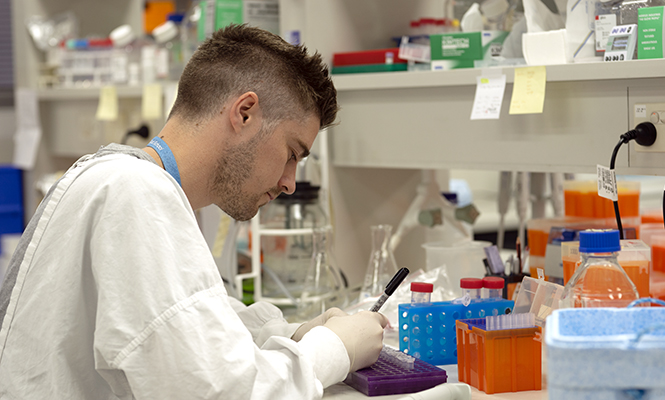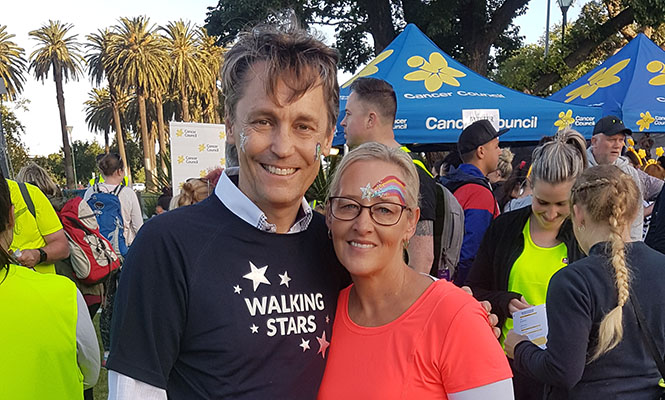
The end of 2019 brought with it some wonderful news: cancer survival is increasing. However, the latest figures show that this progress is not being shared equally across cancers, reinvigorating efforts to ensure no diagnosis needs to be feared.
Across all cancers, 69% of people now live for at least five years after a diagnosis, according to the the Victorian Cancer Registry’s (VCR) 2019 CanStats report. This figure is up from just 42% in the early 1980s, a remarkable jump in treatment and prevention.
But this progress hasn’t been shared equally. Many cancers still see well under half of diagnosed Victorians surviving, prompting some to call for more focus on these ‘forgotten’ cancers.
Fortunately, these calls are being answered.
Thanks to wonderful Cancer Council supporters and the Victorian State Government, $2.5 million was committed last year to fund research into these forgotten, or low-survival, cancers.
These efforts are part of Cancer Council Victoria’s Forgotten Cancers Project, which aims to improve survival for less common cancers.
Cancer Council has also formed the Low Survival Cancers Alliance along with 10 other organisations*, all sharing a simple goal: to see more people survive a cancer diagnosis.
Through research and advocacy for greater funding, the project hopes to help people affected by a range of cancers, including brain cancer.
Taking action on brain cancer
Brain cancer recently overtook leukaemia as the leading cause of cancer deaths in children, despite being the second most common.
Karen knows just how devastating brain cancer is. She lost her 12-year-old daughter, Kiara, to the disease last year.
Kiara’s diagnosis came at around 18 months old.
“They did a scan and took her straight to the ICU and told us she had a tumour the size of an apple,” Karen said.
“We had to give her radiation at the age of 2. The treatment was killing her – it was really hard to watch her suffer. You just felt so helpless.”
Though Kiara did live for more than a decade with brain cancer, her mother said the disease made her life a constant struggle.
“She fought her whole life to be here,” Karen said. “We did get a lot more years with Kiara than some do, but at what price? She had to deal with so much.”

Karen with Cancer Council CEO Todd Harper at the 2019 Walking Stars event
Now, Karen just wants to see more action taken on brain cancer.
Just 26 per cent of Victorians diagnosed with brain cancer live for five years or more, a figure which has remained largely unchanged for decades. It’s a disease that disproportionately affects children and accounts for 43% of cancer deaths in Victorians aged less than 15.
However, with the renewed focus on the disease, it’s hopeful that it can begin making the same strides in survival that many other cancers have, such as prostate, breast, and cervical cancer.
“For brain cancer we haven’t seen the same innovations, so survival remains stagnant,” Professor Sue Evans, Director of the Victorian Cancer Registry, said.
“There are approximately 1200 brain tumours diagnosed in Victoria each year, [but] brain cancer has few treatment options and low five-year survival.
“We need significant investment in dedicated research to improve outcomes for those affected, especially children, who are statistically more at risk of this disease.”
Through the increased funding and the Forgotten Cancers Project, work has already begun on limiting the effects of this devastating disease, as well as many others with similar survival rates.
Progress is being made, with several of these cancers – such as cancers of the liver, lung and pancreas – showing significant improvements in survival across the past decade.
Thanks to the support of people like you, these efforts will see the incredible gains in survivorship shared across all cancers. That means more families will get to stay together, and more children will get to enjoy growing up. That is a wonderful thing, and the work is already well underway.
*Cancer Council Victoria works alongside Asbestos Council of Victoria, AsbestosWise, Bernie Banton Foundation, Brain Tumour Alliance Australia, Isabella & Marcus Fund, Lung Foundation Australia, Leukaemia Foundation, Pancare, Robert Connor Dawes, and Unicorn Foundation.
Read more about the Forgotten Cancers Program and the Low Survival Cancers Alliance.